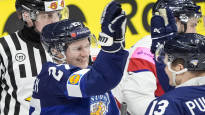Jussi Paasi writes that the big level differences in the World Ice Hockey tournament should be considered from several points of view.
Jussi Paasi sports reporter
Do you remember what was significant in Finnish sports on December 17, 1971?
Representatives of my own generation, i.e. those born in the late 70s and younger than us, may not remember.
You should remember now. After all, you could understand why “pointless” matches are played in the prestigious hockey competitions.
Such as in Prague on Mother’s Day this year.
Leijonat beat Great Britain with a score of 8–0.
The match that started in the afternoon was a dream to watch in every way in the opening set. The tempo of the game was leisurely, downright lazy. The atmosphere in the stands is even more amazing.
Practically everyone knew the winner of the match even before the puck hit the ice. If Finland had lost, it would have been the real mother of shock losses.
The lions didn’t have to perform miracles. The crushing victory came on Sunday’s scrimmage. With a routine. For the Finnish goal saver For Emil Larm I didn’t even break a sweat when Leijonat played at the opponent’s expense from the second set on.
Now let’s get to the question posed in the title. Why are games like this, where the difference between the teams is overwhelming, played at the World Cup level? What is the point?
Differences in level should be considered from several points of view, and not be satisfied with just complaining that Great Britain was bad today.
Ice hockey is a marginal sport that desperately needs a foothold also in countries other than the few top countries of the sport. Lätkä’s lilliputs must be allowed to play against their bigger counterparts in order for even some kind of development to take place. Both in and out of the rink.
One justification for why Britain’s place in the Games was found on the side of the stands. There was a gratifying number of British fans in the Prague Arena. There is enough demand for ice hockey in the mother country of football.
And as I wrote before, you should keep in mind that these games are, in their deepest essence, sports business and entertainment.
The sixteen-team tournament can also be justified by the fact that the level in the B series of the World Cup, or the 1st division, as it is now called, is abysmal. Games against China, Holland or Spain would not develop for example Great Britain in any way. And the fans wouldn’t be interested either.
At this point, someone may ask, what are the benefits of such back saunas to these small countries of the Games. Britain can never beat the Lions!
At this point, it is worth taking a Finnish perspective from more than fifty years ago.
On December 17, 1971, Finland made a miracle in ice hockey. Lions won for the first time against the Soviet Union and Leonid Brezhnev pulled his fur cap over his eyes. Before that, Finland had always lost to the big ice hockey country. Mostly with a fairly fast goal difference.
A bit like how Great Britain now lost to Finland.
The World Championship of the marginal sport includes the smashers seen now. In ice hockey, you simply can’t afford to leave even a budding potential country out of the Games.
And sometimes the day may come when, after the game between Finland and Great Britain, the second song will be heard instead of the Maamme song.
The Ice Hockey World Cup will be played in the Czech Republic from 10 to 26. May. follows events in the app, website, Sports Screen and Sports Radio.
In their next match, Finland will face Norway on Monday, May 13. at 5:20 p.m.
8–0 (1–0, 5–0, 2–0)
16.14: 1–0 Oliver Kapanen (Oliwer Kaski, Ahti Oksanen)
21.15: 2–0 Jesse Puljujärvi (Oliwer Kaski, Ahti Oksanen)
24.52: 3–0 Jere Innala (Mikael Granlund, Iiro Pakarinen)
32.49: 4–0 Juuso Riikola (Jesse Puljujärvi, Ahti Oksanen)
36.01: 5–0 Oliver Kapanen (Jesse Puljujärvi, Mikael Granlund)
38.45: 6–0 Olli Määttä (Mikael Granlund)
46.39: 7–0 Mikko Lehtonen (Konsta Helenius, Mikael Granlund)
52.57: 8–0 Oliver Kapanen (Olli Määttä, Ahti Oksanen)
Finnish power points:
Oliver Kapanen: 3+0
Jesse Puljujärvi: 1+2
Olli Määtta: 1+1
Mikko Lehtonen: 1+0
Juuso Riikola: 1+0
Jere Innala: 1+0
Mikael Granlund: 0+4
Ahti Oksanen: 0+4
Oliver Kaski: 0+
Iiro Pakarinen: 0+1
Konsta Helenius: 0+1
Fights:
Emil Larmi: 5+3+6=14
Ben Bowns: 10+11+18=39
